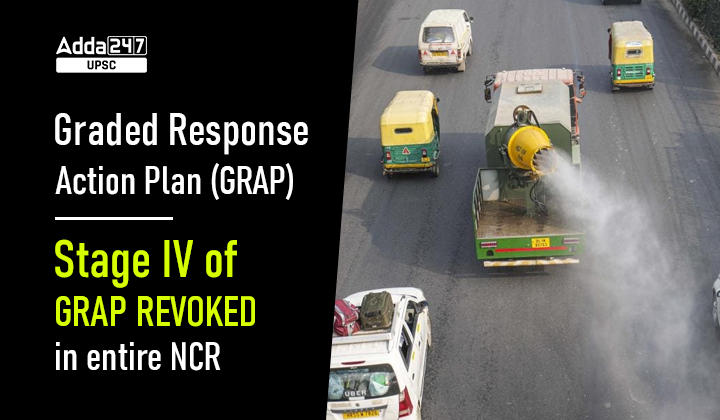Table of Contents
GRAP and Pollution in Delhi NCR: Why Important for UPSC Exam?
Graded Response Action Plan (GRAP): GRAP works as an emergency measure in countering the air pollution in Delhi NCR Region. Graded Response Action Plan (GRAP) is important for UPSC Prelims Exam (Environment Protection) and UPSC Mains Exam (GS Paper 3- Environment Protection and Conservation).
GRAP and Pollution in Delhi NCR: Why in News?
- Recently, Commission for Air Quality Management in NCR & Adjoining Areas (CAQM) revoked the Stage IV of GRAP in view of significant improvement in the overall air quality of the Delhi-NCR seen in the past few days.
- CAQM invoked Stage IV of the Graded Response Action Plan (GRAP) in the entire National Capital Region on 03.11.2022.
- The GRAP Sub-Committee in its earlier meetings had invoked actions under Stage I, Stage II, Stage III and Stage IV of the GRAP on 05.10.2022, 19.10.2022, 29.10.2022 and 03.11.2022 respectively.
Why GRAP Sub-Committee invoked the GRAP State IV?
- In wake of the Delhi AQI nearing the ‘Severe +’ Category (AQI >450), the GRAP Stage-IV actions were invoked on 03.11.2022 based on the AQI forecasts.
- The forecasts also indicated a significant improvement around 5th – 6th November, 2022, therefore, the sub-Committee while invoking Stage-IV of the GRAP, decided for a review of the situation on 6th November, 2022.
- The average AQI of Delhi for 6th November, 2022 has been recorded as 339 (‘Very Poor’ Category), corroborating with the IMD/IITM forecast of an improvement.
- As the present AQI level of Delhi is around 340 which is about 110 AQI points below the threshold for invoking the GRAP Stage-IV actions (Delhi AQI > 450).
- The forecast by IMD/ IITM also do not indicate any steep degradation further.
- The GRAP Stage-IV is a disruptive stage of restrictions and impacts a large number of stakeholders and public at large.
- There are no stricter measures, than as laid in GRAP Stage-IV, that could be taken to improve upon the air quality scenario.
CAQM Advisory to Citizens on Controlling Pollution in Delhi NCR
Commission has once again appealed to the citizens of NCR to cooperate in implementing GRAP and follow the steps mentioned in the Citizen Charter under GRAP. Citizens are advised to:
- Choose a cleaner commute – share a ride to work or use public transport or walk or cycle.
- People, whose positions allow working from home, may work from home.
- Do not use coal and wood for heating purpose.
- Individual house owners may provide electric heaters (during winters) to security staff to avoid open burning.
- Carry out multiple tasks in a single trip. Walk to errands wherever possible.
What is Graded Response Action Plan (GRAP)?
In 2016, the Supreme Court approved it and the plan was prepared by the Environment Pollution (Prevention and Control) Authority (EPCA). The institutionalised measures will be taken when the air quality deteriorates.
How GRAP will work?
As an emergency measure, GRAP works. The plan does not include action by several state governments that to be taken throughout the year to tackle the industrial, vehicular and combustion emissions.
The plan is incremental in nature and when the quality of air moves from “Poor” to “Very Poor” the measures listed under both the sections would have to follow.
If the quality of air reaches severe+ stage then GRAP consists of some extreme measures like shutting down schools and implementing the odd-even road-space rationing scheme.
What are the measures that will be taken under GRAP?
- Severe+ or in an Emergency
(PM 2.5 over 300 µg/cubic metre or PM10 over 500 µg/cu. m. for 48+ hours)
– Entry of trucks into Delhi will be stopped except the essential commodities.
– Construction work will also be stopped.
– For private vehicles odd/even scheme will be implemented and minimise exemptions.
– There will be a task force to decide any additional steps like shutting of schools.
- Severe
(PM 2.5 over 250 µg/cu. m. or PM10 over 430 µg/cu. m.)
– Brick kilns, hot mix plants, stone crushers will be closed.
– Power generation maximisation from natural gas to reduce generation from coal.
– With certain differential rates public transport will be encouraged.
– Mechanised cleaning of the road more frequently and a sprinkling of water.
- Very Poor
(PM2.5 121-250 µg/cu. m. or PM10 351-430 µg/cu. m.)
– Diesel generator sets will be stopped to use.
– Parking fees will be increased by 3-4 times.
– Bus and Metro services will be increased.
– To discourage the burning of fires in winter via Apartment owners by providing electric heaters during winters.
– Advisories will be provided to people suffering from respiratory and cardiac conditions to restrict outdoor movement.
- Moderate to poor
(PM2.5 61-120 µg/cu. m. or PM10 101-350 µg/cu. m.)
– For garbage, heavy fines.
– In brick kilns and industries, Close/enforce pollution control regulations will be there.
– Mechanised sweeping on roads with heavy traffic and water sprinkling.
– To enforce a ban on firecrackers strictly.



 TSPSC Group 1 Question Paper 2024, Downl...
TSPSC Group 1 Question Paper 2024, Downl...
 TSPSC Group 1 Answer key 2024 Out, Downl...
TSPSC Group 1 Answer key 2024 Out, Downl...
 UPSC Prelims 2024 Question Paper, Downlo...
UPSC Prelims 2024 Question Paper, Downlo...
